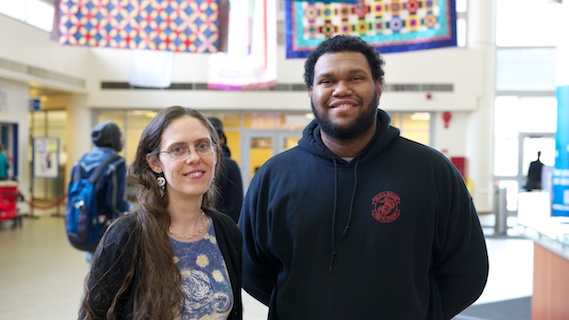
When Arial Diaz was stationed in North Carolina with the Marines a few years ago, he’d sometimes spend his free time lying on the beach at night, gazing up at the stars.
“I really missed my family and friends back in New York,” he recalls. “I’d look up at the night sky and everything was ok.” After Diaz was discharged, he enrolled in BMCC, thinking astronomy might be an easy way to earn a degree.
It was anything but easy, but he stayed with it. “I’d never in my life been motivated to do something,” says Diaz, a science major. “This was the first thing that ever really touched me.”
These days, he is probing the mysteries of deep space as one of only eight students in AstroCom NYC, a program designed to create learning and networking opportunities for minority CUNY students interested in careers in astronomy and physics. Eventually, says Diaz, he hopes to become a professor.
Bringing more minorities into the sciences
Created two years ago, AstroCom is a joint effort of CUNY, Columbia University and the American Museum of Natural History, and funded by the National Science Foundation.
“Minorities are significantly under-represented in the sciences, and the field of astrophysics is no exception,” says Saavik Ford, a professor in BMCC’s Science Department. Students selected for AstroCom NYC attend courses at the museum and mentored research programs on site at participating institutions.
Recently, Diaz and Ford were interviewed by reporter Beth Fertig on NPR’s Morning Edition in a segment entitled “Changing the Face of Astronomy Research.” Joining them was AstroCom director Tim Paglione, who teaches at York College.
Fertig noted that the country’s most famous astronomer, Neil deGrasse Tyson, is African-American, but only 2 percent of all U.S. students earning doctoral degrees in astronomy and physics over an entire decade were either black or Hispanic.
What that means, Paglione commented, is that “we can get just a few more students into grad school, we make a huge impact.”
Since low-income students must often hold jobs to pay for their schooling, AstroCom refunds all tuition costs and pays participating students a stipend. “We don’t want them working,” Paglione said on the show.
“We want them to be concentrating on their academics, so we removed that tuition problem.” In addition, students are provided with a laptop, career and research mentoring, and free Metrocards.
A father’s pride
That said, Diaz’s life isn’t only about academics and astronomy. Raised on the Lower East Side, he shares a small apartment with his father. The living space is not conducive to studying.
“I just don’t have the room,” he said in the NPR interview. “My door doesn’t close and I receive knocks all the time.” But the laptop and Metrocard enable him to study at the museum when he isn’t helping to care for his father, who is blind and diabetic.
“He’s proud of me, even if he doesn’t completely understand what I’m doing,” Diaz said. “He’s saying as long as I’m studying, that’s all he really cares about. Because as long as you’re studying to go forward, you’re not going to go backwards.”
STORY HIGHLIGHTS
- One of only eight CUNY students selected for AstroCom NYC program
- Discusses his interest in deep space on NPR’s Morning Edition
- “Astronomy was the first thing that every really touched me”

